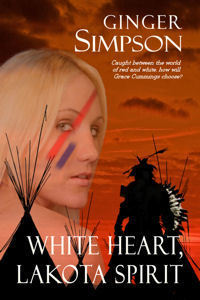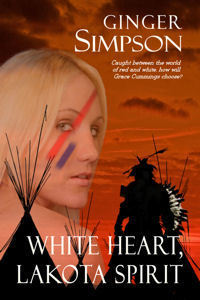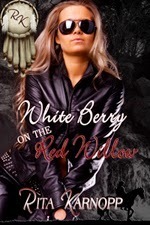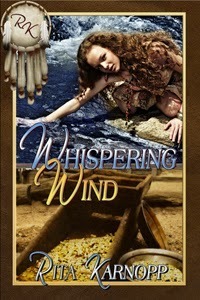Ginger Simpson's Blog, page 80
July 14, 2014
BALANCE WRITING AND LIFE BY RITA KARNOPP

When we hear the word ‘balance’ then add writing and life, an author could almost laugh. It’s a bit of a facetious statement.
When I started writing my children were very young, five and three. So I scheduled my writing time after they went to bed around nine and wrote until two or three in the morning. But, that’s not to say I never wrote during the day – because I did. My office space was in our front living room (because we never used it, we always used the huge family room to the back of the house facing the mountains) and my desk faced the hallway toward the bedrooms. The kids, and their friends, came in and out of that front door – past me – how many times a day?
I set rules and explained they could wave at me, but if they didn’t have anything really important to ask or say, they could just walk on by and not interrupt. It’s called respect when someone is busy working on something that is important to them. It took some time, but they actually got it. I think my husband became the biggest offender of interrupting for ‘non-important’ things.
I’ve said in other articles, my kids now laugh about falling asleep to the clicking of my keyboard . . . and of course there are the hilarious stories of them listening to my printer’s endless buzzing and snapping back and forth . . . and how they waited for it to stop so they could go back to sleep.
Writing time should be designated, planned, and a habit. When we steal more time to write we have to fit it into the whirlwind around us. I find I can now write just about anywhere, with just about anything happening around me. I’ve come a long way from the days when I used to say, “Unless it’s completely quiet – I can’t concentrate to write.”
I write for me and everything else I do for the family. I think my husband and kids respected my need and passion for writing more than family and friends. No matter what I told them, they felt this was one time-consuming hobby. I ignored them because I knew how much it meant to me to see my name on the cover of a book(s). In order to accomplish my goals I had to put my butt in the chair and write.
So what happens when the words slow down . . . and you just know the problem will be solved, you just aren’t sure how. I stop writing. Yep, I go to bed that night and pick up my story in my mind and visualize the scene. I believe my subconscious works out the story while I sleep. The next time I sit down to write, the words flow – the characters pick up where they left off and they continue on their journey.
Another point I’d like to make is – like anything else – you have to learn the process of writing. Yes, you can just sit down and write, but there is more to it than that. You have to know about characterization, plotting, how to create a scene, pacing, motive, etc. Even the most experienced writers still hone their craft. If you’re not willing to learn and be opened-minded enough to listen to ways to improve your writing skills, you’ll never improve. We’ve all heard the comment, “You’re only as good as your next book.” Well it’s true.
Be sure to take advantage of basic (then advanced) writing courses and seminars. Apply what you’ve learned and write the best book you can . . . each and every time.
If you’re passionate about writing (and once the bug has bitten you – there’s no turning back) you must make it as important as family movie night or tucking the kids into bed. Make time for the things that you want to do and love . . . do it for you.
Published on July 14, 2014 01:00
July 13, 2014
Released July 12, 2014 - Sarah's Heart & Passion
 Look a little familiar? I've combined two books into one with hopes it will soon be available in print, and Michelle Lee has designed a dynamite cover from the two that captures the essence of the story. This book was originally a stand alone story about Sarah's Journey, but I actually received a couple of reviews that had my reviewers in tears because they didn't like the way the story ended...so I wrote a sequel for those who didn't understand the story and why there was no HEA for a white woman and a half-breed man in the 1800s. Now, you can read the entire story, and it's a great combination of the old west, time-travel, humor,contemporary, romance, and even a little fantasy. In fact, I had a hard time trying to decide how to categorize it. Be the first to leave a review and let me know how much you enjoy Sarah's story.
Look a little familiar? I've combined two books into one with hopes it will soon be available in print, and Michelle Lee has designed a dynamite cover from the two that captures the essence of the story. This book was originally a stand alone story about Sarah's Journey, but I actually received a couple of reviews that had my reviewers in tears because they didn't like the way the story ended...so I wrote a sequel for those who didn't understand the story and why there was no HEA for a white woman and a half-breed man in the 1800s. Now, you can read the entire story, and it's a great combination of the old west, time-travel, humor,contemporary, romance, and even a little fantasy. In fact, I had a hard time trying to decide how to categorize it. Be the first to leave a review and let me know how much you enjoy Sarah's story.Here's the blurb:
Sarah Collins set her sights for California and a new beginning, but never imagines a war party's attack on the wagon train she joins. A sole survivor, Sarah must find her way back to civilization, and a man of half-blood happens along at just the right time and becomes her hero...or is the whole scenario only a dream driven by all the romance novels she reads as an editor?
Sarah wakes, her cheeks damp with tears. Like a dust devil in a dying windstorm, all traces of her handsome rescuer vanish with a farewell kiss and the annoying blast of an alarm clock...until he appears at her door as a new neighbor. Will Sarah find a way to win the love she tried so hard to capture in her dream without being declared insane, or will the sexy woman living an apartment away beat Sarah at her own game?
Previously published as Sarah's Heart and Sarah's Passion, this edition combines both stories
You can purchase this book on Amazon.
Published on July 13, 2014 21:04
July 10, 2014
Friday Freebits with Ginger - #frifreebits #blogshare
 Today, I'm continuing with White Heart, Lakota Spirit, and hoping you are enjoying it as much as I am. Sometimes re-reading a story brings back the excitement the author felt when writing it. I'm engrossed all over again. Here's my six paragraphs about Grace Cummings and her family camped by the Black Hills.
Today, I'm continuing with White Heart, Lakota Spirit, and hoping you are enjoying it as much as I am. Sometimes re-reading a story brings back the excitement the author felt when writing it. I'm engrossed all over again. Here's my six paragraphs about Grace Cummings and her family camped by the Black Hills.***********
The yelling grew louder as they came closer.The furrows in her father’s brow frightened Grace “What is it, Papa?”
He darted for the wagon. “It’s Injuns! Hurry! You two women get inside and keep low. Kevin, get yer rifle!”
Grace’s heartbeat quickened and fear clutched her chest, making it hard to breathe. She’d heard about savages, but never saw one up close. She didn’t want to.
Her mother stood frozen in place. Grace grabbed her hand and pulled. “C’mon, Mama, we’d better do as Papa says.”
They ran around to the back of the wagon, and her mother boosted her up and over the closed tailgate. Grace dove inside, her mind filled with horrible thoughts. Would she get scalped or worse…were they all going to die?
All the while, piercing yells sliced the air while thundering hooves pounded the ground.
*******

Like it? Did you check out the snarky reviews on Amazon? You can find White Heart, Lakota Spirit on my Amazon page. Do they fit?
Now, please visit my fellow authors who participate in this weekly feature and check out their offerings:
Jamie Hill
Tricia McGill
Juliet Waldron
Taryn Raye
Kathy Fischer-Brown
Rhobin Lee Courtright
Margaret Tanner
Published on July 10, 2014 23:30
POLISH THAT NOVEL BY RITA KARNOPP
 We’ve all heard the expression, polished writer . . . well we should also make sure we have a polished novel. Write the book that flows, is exciting, grabs your senses, is powerful, and is tight and crisp.
We’ve all heard the expression, polished writer . . . well we should also make sure we have a polished novel. Write the book that flows, is exciting, grabs your senses, is powerful, and is tight and crisp.There are some simple tricks you can do to make sure your book has that polish.
Let’s start by talking about writing short sentences. Don’t you hate the sentence that is a paragraph long with about twelve commas? I know I do. You almost have to go back and read it again, just to make sure you caught it all! There are never too many ‘hard returns.’
Names can be cleaned up and polish your book. How? Never have several characters starting with the same alpha; John, Janet, Jimmy, and Jordan. Sheesh, that’s the kiss of death . . . the reader can’t remember who is who!
Be careful to always call a character by one name . . . Lawrence Johnson can be Larry or Johnson (detectives have a way of using last names) but not both after an introduction.
Use names that fit your characters. It would be difficult to find out Bubba Smith is the killer or Sissy Summer poisoned her mother. I’d believe Derek Macklin and Dana Gruby might be killers. Just be careful to make everything, right down to a character’s name – believable.
Be careful with slang. What might be ‘common language’ in your state might not be the case in another. For instance in Montana they refer to ditches as coulees. Who woulda thunk?
And another little tip, use swearing sparingly. Offensive language is just that – offensive. I agree that there are just some characters who would absolutely, without a doubt, no questions asked say the ‘F’ word. I had to use it once, and I shocked myself. My character blurted it out and I knew I had to type it. (That was sooo against my natural self – and I shocked a few of my family and friends when they read the book.)
We have to be honest to our characters – our readers will see right through a tough, mean jerk who says, “Golly gee!”
These simple writing comments will tighten your story and make it shine more than you could imagine. Sometimes it’s the little things that make the biggest difference.
Published on July 10, 2014 01:00
July 9, 2014
A Page Straight from Ann Herrick - #apagestraightfrom
 My Summer Boyfriend
byAnn Herrick
My Summer Boyfriend
byAnn HerrickLogan grinned as he led me into the house. "It's a three-story climb up to the turret. But it's worth it just for the view."
The stairway alone was enough to impress me. The wide stairs were thickly carpeted and bordered on each side by ornately carved mahogany railings. Tiny sconces lit the way. They looked so much like real candles that I almost expected them to drip wax.
"Whew! That was some climb." I puffed, trying to catch my breath at the top of the stairs. But Logan was right—the view was worth the effort. I could see for miles.
As I stepped into the room itself I felt as if I were entering a castle. Window seats cushioned with green velvet pillows were built in under three arched windows with crosshatched leaded panes. Pink and purple rays of the sunset flooded the room through the diamond-shaped panes of glass, brightening, for a moment, a room otherwise dimly lit by a single sconce.
"Take a load off your feet," Logan invited. He sat on the middle window seat and pulled me down onto his lap. Out the window I could see the figures of Alex and Nicole on the beach. Alex had his hands on his hips. Nicole was pointing toward the house. I tried to ignore them.
"The sunset is beautiful," I said. Even as I admired the tones of gold and pink sinking in the west, I tried to slip off Logan's lap. His grip tightened around my waist.
"You're beautiful," Logan said. He pushed me back against the soft pile of pillows.
I stiffened as his body pressed against mine. I could feel his hot breath all over my face. His prolonged kiss sent a shiver of panic to the pit of my stomach. Finally he stopped kissing me long enough for me to catch my breath. "Logan. Let's go downstairs, now," I said shakily.
"I'd rather stay here," he answered huskily. "Just settle back and relax." He engulfed my mouth in another kiss. I felt his hand sear a path up my back and fumble with the zipper of my dress. When I heard the zipper going down, I pressed against a pillow, hoping to immobilize his fingers. Logan stopped kissing me. His face was flushed. "Look," he said, his voice shaky, "all this may have started as just a favor to Nicole, but now I really want you."
Want you! The words echoed in my head like a five-alarm warning siren. "No," I said firmly, even though my heart was pounding. "I want to get out of here."
"Please." Logan's voice was pleading, and his eyes had a glazed expression, but he loosened his grip on me slightly.
"I want to go," I said, trying to keep my voice even.
"Take your hands off her!" From out of nowhere Alex hovered over us.
Buy link
Published on July 09, 2014 00:00
July 8, 2014
MAKE YOUR FEMALE VILLAIN STRONGER THAN HER GUN BY RITA KARNOPP
 One of today’s hottest plots is the female villain. Really? The killer is always the jilted male, the psychotic male, the bomber male, the fired male, etc. Now we are introducing the really bad villain female. She is cunning, touch, intelligent, and twisted.
One of today’s hottest plots is the female villain. Really? The killer is always the jilted male, the psychotic male, the bomber male, the fired male, etc. Now we are introducing the really bad villain female. She is cunning, touch, intelligent, and twisted.There’s nothing typical about the female villain, yet she’s believable in every way. Don’t make her the male version of a ‘bad guy.’ Once you get past that - you have liberty to create her however you want.
The reader hasn’t had a lot of experience with the really bad woman. We (the writer) have an opportunity to use that lack-of-experience and allow – even manipulate our readers to underestimate what she’s capable of. Make her believable and the reader is in for a lesson in ‘bad.’
You should make your female villain stronger than her gun. Keep this in mind and it’ll affect how you present your female villains.
You could easily make your female villain seem weak and vulnerable, yet underneath she’s intelligent, savvy, and coy; fooling everyone. I would refrain from making her the female Hannibal Lecter unless you can make her believable.
Your female villain can be tough, as threatening as any man, but don’t let the reader forget she’s a real woman. You can allow her to be hard on the exterior, but when she’s alone show her vulnerability. Readers identify with a character that cries in the shadows of her closet or under the sheets at night when she’s totally alone.
Like any male villain, the reader wants to know what makes your female villain tick. Was she a victim of rape? Did she feel responsible for killing her mother at birth? Was she blamed for a sibling’s drowning? Victimizing the female villain lends realism that the reader can relate to.
One last way to make your female villain real is by giving her a fear. What? Yep, think about it. Indiana Jones hated snakes and we all got off on seeing him squirm every time he had to face one or a pit of them. Relatable fears or phobias make characters seem real and give you an opportunity to use them to present obstacles and the human side of your female villain.
Published on July 08, 2014 01:00
July 7, 2014
GRIPPING SCENES BY RITA KARNOPP
 What exactly composes a scene? I think of a scene like a trip to the mountains. There are valleys of flowers and cliffs of varying shapes and colors. Sometimes the end of the trail leads to a beautiful waterfall. Suddenly we notice a dead body floating at the far end . . . and the story begins. Each scene you create should stand on its own and add to the story in a crucial way, creating a structurally solid read.
What exactly composes a scene? I think of a scene like a trip to the mountains. There are valleys of flowers and cliffs of varying shapes and colors. Sometimes the end of the trail leads to a beautiful waterfall. Suddenly we notice a dead body floating at the far end . . . and the story begins. Each scene you create should stand on its own and add to the story in a crucial way, creating a structurally solid read.How do we make scenes intrinsically sound? The way I do it is to imagine every scene in my head. I see my characters and feel what they’re feeling and understand why they react the way they do. If you run your story through your mind like a movie, you’ll find holes and implausible behavior.
This is a good way to let your characters take over, do what comes naturally, and lets them improvise . . . my characters have written some of my best scenes.
Check the beginning of each scene and make sure it grabs your reader immediately. Again keep in mind, “no one waits for the action to begin.”
Don’t just be concerned with scene beginnings, but be equally aware of scene endings. This is your chance to make the reader unable to close the book and continue another time. Stop just when your character is going to make a critical decision or when something terrible just happened or is just about to happen. Maybe the character is pushed to the limit and is ready to either explode or do something they might regret. Make your reader decide, ‘ok, just one more chapter.’ If I’m into a book – I’ve been known to close it (begrudgingly) at three am.
I know this might sound strange, but a scene must serve a purpose. Its job is to further the story, clear-up or create doubt, and add intensity. It must nurture the story and keep our readers turning the pages.
Be aware of placing in every scene. Dialog can speed up your scene and thoughts and descriptions will slow them down. This creates a feeling of movement. You can use internal and external conflict, dialogue, actions, and description to draw the reader from chapter one to reading ‘the end.’
Each scene should be as strong as the previous one. Make sure there isn’t idle dialog or paragraphs of descriptions, or endless internal conflict that slows or weakens the scene. Introspection can be a killer if it’s overdone. Idle conversation; “Hi, how are you?” “Hi, I’m fine.”“Where are you going?”“Home, I’m tired.”“You want to go to a movie with me?”“No, I’m just tire and want to put my feet up and relax.”Yikes, I’d toss that book across the room and pick it up only to toss it in the trash. Cut . . . cut . . . cut those weak areas and tighten up each scene. Look for the outcome of each scene and make sure your character achieved his objective.
 Don’t be nice all the time. Don’t make everything turn out happily ever after. Real life, as well as the lives of our characters, is full of ups and downs. There are conflicts, reactions, accidents, premeditations, disappointments, etc., and sometimes bad things happen.
Don’t be nice all the time. Don’t make everything turn out happily ever after. Real life, as well as the lives of our characters, is full of ups and downs. There are conflicts, reactions, accidents, premeditations, disappointments, etc., and sometimes bad things happen. Again, make each scene grip the reader and wanting more. Make your reader care by creating scene after scene that fulfills the journey until the end.
Published on July 07, 2014 01:00
July 4, 2014
Friday Freebits with Ginger #frifreebits #blogshare
 Welcome back. This week, more from
White Heart, Lakota Spirit.
Hope you are enjoying the read.
Welcome back. This week, more from
White Heart, Lakota Spirit.
Hope you are enjoying the read.She gazed at the hills where sunburned and smelly men searched every day for the elusive gold. Rumors had exaggerated its abundance, but that didn’t dampen Papa’s spirit; he was determined to find the mother lode. The sea of browning grass around her whipped in the breeze, stirred her loneliness, and turned her insides hollow. Her eyes misted. How long did Papa expect her and Mama to sit idle all day? A person could only do so many chores while conserving water in this…this purgatory. Grace raised her gaze skyward. “Please God, let Papa find gold soon, so we can get back to civilization.”
“Grace, dear!” The sweet sound of Mama’s voice interrupted her prayer. “Get the flour and salt out of the wagon. We’ll be needin’ some biscuits to go with the beans for dinner. Papa and Kevin will be hungry when they come down from the mountain.”
Great! Beans again. What she wouldn’t give for some variety.She shook her head. How could Mama call this place home?Grace climbed on the wagon tailgate and searched through the food bin, and finding what she needed, slid back down to the ground.
“Got ‘em, Mama,” she called. “If you want, I’ll make the biscuits.”At least helping with dinner gave her something to do.
A shelf bolted to the wagon bed served as a work area. Gracemade space for her bowl and mixed together the floury concoctionto bake in a Dutch oven. She longed for the luxury of the cookstove in their last home, despite not being there long enough totruly enjoy it. Papa had traded a team of horses for the old irongiant, and Mama had claimed she’d died and gone to heaven whenhe and Kevin toted it inside.
Grace stopped stirring and sighed, staring blankly at the whiteexpanse of wagon bonnet in front of her. The family had had morehomes than she could count. Mama always told her they moved somuch because Papa was born under a wandering star. SometimesGrace wished it would fall to the earth like other shooting starsshe saw at night.

All my books are available on my author's page at amazon. Someone thought this cover smacked of eroticism??????
Now...here's the list...jump on over to the next person's site and check out their offering:
Jamie HillTricia McGillJuliet WaldronTaryn RayeKathy Fischer-BrownRhobin Lee CourtrightMargaret Tanner
Published on July 04, 2014 10:31
July 3, 2014
Friday Freebits with Ginger - #frifreebits
 I'm currently sharing six paragraphs from White Heart, Lakota Spirit, a work I hope to re-acquire some day so I can add in all the little rules I've learned since I first wrote the book and make it a better read. As is, I still think it's a "bang for your bucks."
I'm currently sharing six paragraphs from White Heart, Lakota Spirit, a work I hope to re-acquire some day so I can add in all the little rules I've learned since I first wrote the book and make it a better read. As is, I still think it's a "bang for your bucks."For the present, I'm not at all happy with the "snarky" reviews I've gotten on Amazon, so if you like what you're reading and decide you'd like to review my book, I would greatly appreciate something favorable and TRUE. I'm amazed that readers don't know that frequently women were taken hostage and choose to remain with their captors, whether out of an formed relationship or fear of how they would be treated after being a captive. It's history, people! In my FICTIONAL story, my heroine decided where her heart truly belonged.
 I also detest that someone felt the need to "tear down" the image my cover portrays, saying it smacked ofporn and Victoria Secret. Of course then someone else followed the leader. Actually, Dawne Dominque captured the essence of the story with her creativity, and given all the practically nude and suggestive photos used on covers, I have no idea why someone felt a need to be so unkind. Judge for yourselves. A young blonde woman is captured by the Lakota...does the image work? I loved it!
I also detest that someone felt the need to "tear down" the image my cover portrays, saying it smacked ofporn and Victoria Secret. Of course then someone else followed the leader. Actually, Dawne Dominque captured the essence of the story with her creativity, and given all the practically nude and suggestive photos used on covers, I have no idea why someone felt a need to be so unkind. Judge for yourselves. A young blonde woman is captured by the Lakota...does the image work? I loved it!Oh well...on with my six paragraphs...
***********************
Kev and I will finish our temporary shelter, so we can spread outa bit.”
No more climbing in and out of a wagon to sleep. Grace clapped.“Oh, Papa, that sounds so good.”
She sobered and flashed the look that always won him over…the half-pout, wistful gaze. “When we finally settle in our real house, it will be near a town, won’t it? Otherwise, how do you expectme to be courted out here in the middle of nowhere?”
“I’m not so sure I want you to be cour...” He jerked around and looked over his shoulder. “Do you hear that?”
“Hear what?” Kevin asked.
“I hear it, Papa,” Grace chimed in. “Sounds like yelling.”
Her father stood and scanned the horizon. He pointed. “Look. There!”
***********************
If you'd like to check out the reviews or purchase your own copy, you can find White Heart, Lakota Spirit on my Amazon page.
Now hop on over to the other Friday Freebitters and see what they are offering up. Bet you'll love it!
Jamie Hill
Tricia McGill
Juliet Waldron
Taryn Raye
Kathy Fischer-Brown
Rhobin Lee Courtright
Margaret Tanner
Published on July 03, 2014 23:30
THE SUPERLATIVE TITLE BY RITA KARNOPP
One of my favorite things to do is give my book a title. Most times I’ll give it a ‘working title’ because I know the ‘true title’ will reveal itself while writing the book.
Titles should be inspiring – even catchy. While doing research for my book Whispering Sun, I ran across the sentence, The white man didn’t like the bitter taste of the white berry off the red willow, but the native found the medicinal properties worthy of putting it into other foods to mask the taste. It’s a rather plain and factual sentence – right?
 That sentence jumped out and grabbed me! My wheels started churning … my white berry could be my white heroine and the red willow would be the Indian nation. Thus became one of my favorite books, The White Berry on the Red Willow. I can’t tell you the number of people who’ve said, “That’s a great title.”
That sentence jumped out and grabbed me! My wheels started churning … my white berry could be my white heroine and the red willow would be the Indian nation. Thus became one of my favorite books, The White Berry on the Red Willow. I can’t tell you the number of people who’ve said, “That’s a great title.”
Ekuskini, son of the Blackfeet chief, revels in the demise of the non-Indian. Then he meets Alcina and finds himself searching the old ones for the answers. Together Alcina and Ekuskini realize they must learn from the past and use it to make things better for the future of all people.
A great title is everything and should be the advertisement of what’s inside. Your title needs to stand-out in the slush pile and also shout ‘read me!’ We’ll even go one further and repeat the over-used cliché – “You can judge a book by its cover.”
Create strong titles that are distinctive and memorable. They must reflect what’s inside – or you’ll hear about it. Titles should draw attention and make the shopper reach out and wonder, ‘what’s this one about?’
 One thing you don’t want to do – not on purpose anyway, it title your book and find out after it’s published there are two other books with the exact title. I wrote and had my book Atonementpublished before the movie came out. Ugh. .. and recently a friend titled her book Atonement . . . and I thought ‘seriously?’ So I went out to google and searched my title, which I should have done way before submitting it to my publisher. There were six books entitled Atonement. I’ll never make that mistake again!
One thing you don’t want to do – not on purpose anyway, it title your book and find out after it’s published there are two other books with the exact title. I wrote and had my book Atonementpublished before the movie came out. Ugh. .. and recently a friend titled her book Atonement . . . and I thought ‘seriously?’ So I went out to google and searched my title, which I should have done way before submitting it to my publisher. There were six books entitled Atonement. I’ll never make that mistake again!
If you’re struggling with the title (I don’t think that’s ever happened to me) you can create a list of possible titles and ask friends or family if they like any of them. I’ve seen authors go out on ‘writing’ sites and ask for a little help . . . nothing wrong with that. There’s something to be said for ‘public opinion.’
A strong thing to consider when naming your book is voice. What? Well think about it this way; My Wild Cowboy would not be written in third person. You wouldn’t mix point of view inside your book – so remember to be consistent also with the outside.
We’ve heard one word titles sell better than three or four . . . short is better than long . . . but there really isn’t an algorithm for naming a book. I’ve heard it said choose precise nouns and strong, active verbs. White Berry on the Red Willow is certainly better than Alcina under a Tree. LOL
Publishers say readers think about your title realistically three times; when they purchase it, when they start reading, and again when they finish reading. You should hope the reader will close your book (at ‘the end’) and reflect how the title adds even more to a fabulous read.
 Now we come to a point that really gravels me. Don’t allow your title to reveal the plot of the book. The title, One Survivorreally got to me. Yes, I know, it was based on true events . . . but I don’t care. Don’t tell me that – now I’m not sure I care.
Now we come to a point that really gravels me. Don’t allow your title to reveal the plot of the book. The title, One Survivorreally got to me. Yes, I know, it was based on true events . . . but I don’t care. Don’t tell me that – now I’m not sure I care.
Another good point I’ve read– and have always remembered – don’t use the first or last lines of your story as the title for your book. It pilfers the surprise of the opening hook or the intense conclusion.
Every title you produce is an affirmation of one thing – you’ve just finished another book and the pride you feel is beyond any paycheck. Pat yourself on the back and stare at your title and cover . . . celebrate and know you’ve accomplished something many people just talk about. You’ve just written a book and it has a great title and your name on the cover.
Titles should be inspiring – even catchy. While doing research for my book Whispering Sun, I ran across the sentence, The white man didn’t like the bitter taste of the white berry off the red willow, but the native found the medicinal properties worthy of putting it into other foods to mask the taste. It’s a rather plain and factual sentence – right?
 That sentence jumped out and grabbed me! My wheels started churning … my white berry could be my white heroine and the red willow would be the Indian nation. Thus became one of my favorite books, The White Berry on the Red Willow. I can’t tell you the number of people who’ve said, “That’s a great title.”
That sentence jumped out and grabbed me! My wheels started churning … my white berry could be my white heroine and the red willow would be the Indian nation. Thus became one of my favorite books, The White Berry on the Red Willow. I can’t tell you the number of people who’ve said, “That’s a great title.”Ekuskini, son of the Blackfeet chief, revels in the demise of the non-Indian. Then he meets Alcina and finds himself searching the old ones for the answers. Together Alcina and Ekuskini realize they must learn from the past and use it to make things better for the future of all people.
A great title is everything and should be the advertisement of what’s inside. Your title needs to stand-out in the slush pile and also shout ‘read me!’ We’ll even go one further and repeat the over-used cliché – “You can judge a book by its cover.”
Create strong titles that are distinctive and memorable. They must reflect what’s inside – or you’ll hear about it. Titles should draw attention and make the shopper reach out and wonder, ‘what’s this one about?’
 One thing you don’t want to do – not on purpose anyway, it title your book and find out after it’s published there are two other books with the exact title. I wrote and had my book Atonementpublished before the movie came out. Ugh. .. and recently a friend titled her book Atonement . . . and I thought ‘seriously?’ So I went out to google and searched my title, which I should have done way before submitting it to my publisher. There were six books entitled Atonement. I’ll never make that mistake again!
One thing you don’t want to do – not on purpose anyway, it title your book and find out after it’s published there are two other books with the exact title. I wrote and had my book Atonementpublished before the movie came out. Ugh. .. and recently a friend titled her book Atonement . . . and I thought ‘seriously?’ So I went out to google and searched my title, which I should have done way before submitting it to my publisher. There were six books entitled Atonement. I’ll never make that mistake again!If you’re struggling with the title (I don’t think that’s ever happened to me) you can create a list of possible titles and ask friends or family if they like any of them. I’ve seen authors go out on ‘writing’ sites and ask for a little help . . . nothing wrong with that. There’s something to be said for ‘public opinion.’
A strong thing to consider when naming your book is voice. What? Well think about it this way; My Wild Cowboy would not be written in third person. You wouldn’t mix point of view inside your book – so remember to be consistent also with the outside.
We’ve heard one word titles sell better than three or four . . . short is better than long . . . but there really isn’t an algorithm for naming a book. I’ve heard it said choose precise nouns and strong, active verbs. White Berry on the Red Willow is certainly better than Alcina under a Tree. LOL
Publishers say readers think about your title realistically three times; when they purchase it, when they start reading, and again when they finish reading. You should hope the reader will close your book (at ‘the end’) and reflect how the title adds even more to a fabulous read.
 Now we come to a point that really gravels me. Don’t allow your title to reveal the plot of the book. The title, One Survivorreally got to me. Yes, I know, it was based on true events . . . but I don’t care. Don’t tell me that – now I’m not sure I care.
Now we come to a point that really gravels me. Don’t allow your title to reveal the plot of the book. The title, One Survivorreally got to me. Yes, I know, it was based on true events . . . but I don’t care. Don’t tell me that – now I’m not sure I care. Another good point I’ve read– and have always remembered – don’t use the first or last lines of your story as the title for your book. It pilfers the surprise of the opening hook or the intense conclusion.
Every title you produce is an affirmation of one thing – you’ve just finished another book and the pride you feel is beyond any paycheck. Pat yourself on the back and stare at your title and cover . . . celebrate and know you’ve accomplished something many people just talk about. You’ve just written a book and it has a great title and your name on the cover.
Published on July 03, 2014 01:00



